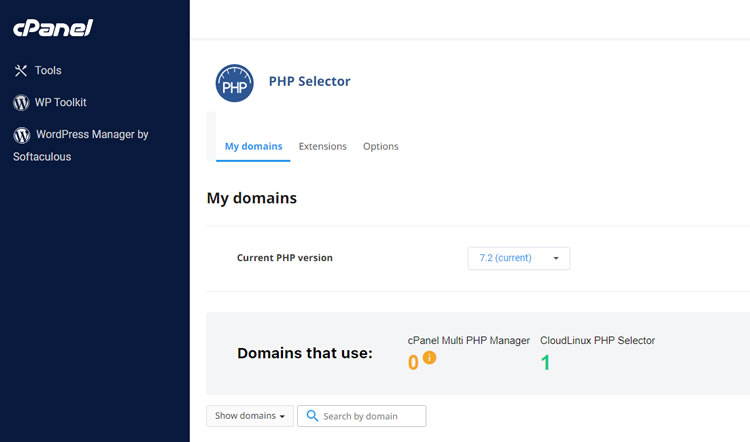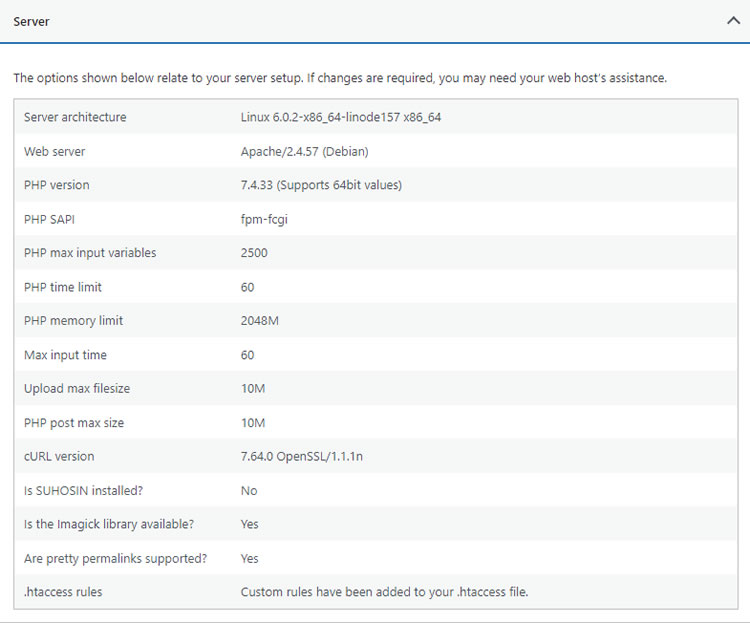Different web hosting companies support different PHP versions – which can have a major impact on the operation of your website. While most web hosts would tell you that they give their best effort to support the latest or recent PHP versions, it isn’t always the case.

Why PHP Version Matters to Web Hosting Users?
There are numerous ways the PHP version can impact your website and choice in web hosting.
- Compatibility with Applications Many web applications, like WordPress, Joomla, and Drupal, have specific requirements for PHP versions. Using an outdated PHP version can lead to compatibility issues, prevent you from using certain plugins or features, or even block installation altogether. Before choosing a host, ensure that it supports the PHP version required by your applications.
- Security: PHP versions receive security updates only for a certain period. Once a version is no longer supported, it will not receive any security patches, making it vulnerable to attacks. Hosting with the latest supported PHP versions can protect you from known security threats.
- Performance: Newer PHP versions generally offer significant performance improvements over their predecessors. For example, PHP 7.x versions are much faster than PHP 5.x, leading to quicker load times and a better user experience. Improved performance can also reduce server load and allow your website to handle more visitors simultaneously.
- Availability of Features: Each new PHP version introduces additional features and deprecates older ones. If your website requires specific PHP features, this can be a deciding factor in choosing a hosting provider. It’s important to review the PHP features and functionalities supported by your hosting service to ensure they align with your development needs.
In short, if you plan to maintain your site over several years – look for a host that commits to supporting new PHP versions promptly after their release. Also, consider a web host that allows you to switch between different PHP versions as needed. This flexibility can be vital for testing and deployment.
The Highest PHP Versions Supported at Different Hosting Services
When we say a web hosting company supports a PHP version, we mean that the hosting environment is configured to run that PHP version. This is important because it decides what features your website can use and how secure it is.
Hosting companies typically aim to support newer versions of PHP to offer better performance and security to their customers. However, the frequency of these updates varies between web hosts, with some offering immediate upgrades and others lagging behind.
In the following table, I have compiled a comparison of some popular web hosting companies and the highest PHP versions they currently support. Keep in mind though – these details may change over time as PHP continues to evolve and hosting providers update their supported versions. At this time of writing, the latest PHP is version 8.3 (released November 2023) and the upcoming release (PHP 8.4) is scheduled to be available on November 21st, 2024.
| Highest PHP Version Support | Web Hosting Companies |
|---|---|
| PHP 8.2 | Bluehost, Cloudways, DreamHost, GreenGeeks, Hostinger, InMotion Hosting, Kinsta, Siteground, TMD Hosting, WP Engine, UltaHost, Verpex |
| PHP 8.2 | A2 Hosting, HostGator, HostPapa, Namecheap |
| PHP 8.0 | IONOS |
| PHP 7.4 | GoDaddy |
PHP Explained
PHP (official site) is an open-source scripting language widely used in web development. People use PHP to do more complex tasks for their websites, such as generating dynamic web page content, interacting with databases, or sending and receiving cookies.
If you’re using a content management system like WordPress or Drupal, or an e-commerce platform like PrestaShop, you have already been using PHP for your site as those platforms are all built on PHP.
In the context of web hosting, the PHP version your host supports can have significant implications for your website. It affects your website’s security, compatibility with certain software, and performance.
Understanding PHP Versions
PHP versions are similar to versions of any other software – they mark stages of development, with each release providing new features, enhancements, and improvements in performance and security. Since its inception, PHP has gone through several version updates.
Here are the recent few PHP versions and their notable features:
PHP 7.4
The fourth version of PHP 7 (PHP 7.4.0) was released in November 2019. This version introduced arrow functions, preloading, and typed properties. Arrow functions provide a more concise syntax for anonymous functions.
PHP 8.0
First released in November 2020, PHP 8.0 brought in several major updates, including the JIT (Just In Time) compiler, which significantly improves the performance of PHP scripts. It also introduced Union Types, Named Arguments, Attributes, and the ‘match’ expression. At this time of writing, the latest version of
Differences between PHP versions not only lie in features but also in performance. For example, PHP 7.0 was reported to perform 400% better compared to its predecessor PHP 5.6. Similarly, PHP 8.0, with its JIT compiler, showed 20% performance improvements over PHP 7.0 versions (source).
How to Check Your Current PHP Version?
Using cPanel
Determining your current PHP version is fairly simple. If your web host uses cPanel, you can find the PHP version in the “PHP Selector” section. Alternatively, you can create a .php file with the phpinfo() function and upload it to your website. By accessing this file via your browser, you can view your PHP version.

Using WordPress Site Health
For WordPress users, your PHP version is typically displayed in the Site Health section, found in the Tools menu.

Final Thoughts
Having an understanding of PHP versions and their differences is vital as they directly impact the functionality and security of your website. It’s always advisable to keep your PHP version up-to-date, utilizing the latest features and security enhancements offered by the PHP group.
Frequently Asked Questions about PHP
Which PHP version is best for WordPress?
WordPress officially recommends using PHP 7.4 or higher. However, the best PHP version to use for WordPress is typically the latest one that is fully supported and tested with the WordPress core, which currently includes PHP 8.1 and 8.2.
Which PHP version is best for Joomla?
For Joomla users, the optimal PHP version is the latest one officially supported by the Joomla core. As of the latest updates, Joomla 3.x supports PHP versions up to 7.4, while Joomla 4.x supports and is optimized for PHP 8.0 and 8.1. It’s essential to use a PHP version that not only delivers better performance but also ensures compatibility with Joomla’s requirements and future updates.
How to update PHP version of my hosting?
Generally, you can manage (downgrade or upgrade) your server PHP version from your hosting control panel (such as cPanel, Plesk, or DirectAdmin). Once logged in, look for the “PHP Version” or “Select PHP Version” section, which is often found under the “Software” or “Services” category. From there, you can choose the new PHP version from a dropdown list or similar interface. If you are unsure or need more specific guidance, it’s best to contact your hosting provider’s support team for assistance.



